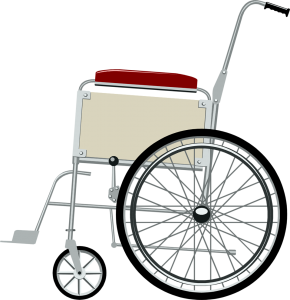
Most people have the same basic preparedness needs as everyone else; however, some individuals have special needs that go beyond the basics. This blog was written for those who have age- or health-related disabilities, yet are able to independently prepare outside of a crisis. Preparing in advance helps avoid problems before the storm “is on the horizon”.
Unique Needs
If you have unique needs, create a detailed description that includes specific (if unusual) information about your daily routine. It will be helpful to document actions that cause extra pain, nervousness, or distress (i.e., lying flat on your back without a pillow under your knees, loud noises, etc.).

Communicate Your Needs
Create a support network to help you in an emergency and then let them know what you need. Hold an informal meeting with everyone included and affected by your unique needs. Tell them where you keep your emergency supplies and give one member of your support network a key to your house or apartment. If you are not already doing this, in times of heightened alert, wear medical alert tags or bracelets to help identify your disability.
It Takes a Village
Contact your city or county government’s emergency information management office. Many local offices keep lists of people with unique needs so they can be located quickly in case of an emergency.
Let your utility company know of your needs, especially if you depend on electricity to operate medical equipment. They can let you know if the electricity will be disconnected for routine service and may also make your home a priority to get you reconnected as soon as possible.
Medical Considerations
Circumstances change and sometimes they change without warning, so it makes sense to pull out your emergency supply kit and look it over every other month to make necessary adjustments. If you included medications in your kit, check the expiration dates and if the medications are still ‘in date’, add them to your current rotation and replace those in your kit with a fresher supply.

In your kit, list all medications you are taking including the dosage, who prescribed the medication and contact information for the pharmacy you use for refills. If not already notated on the medication, include special instructions (i.e., must be crushed, cut tablets in half, place crushed tablet in applesauce, what to do if you’ve missed a dose, etc.). List any allergies.
If you have medications that need to be maintained at refrigerator temperatures, purchase a small cooler and store it inside your emergency supply kit. Meanwhile, purchase several ice packs to use for this specific purchase. NOW is the time to place them in the freezer so they are always at-the-ready.

If you have an extra pair of eyeglasses, include them, along with extra wheelchair and hearing-aid batteries, oxygen, etc. Don’t forget to take your medical insurance and your Medicare cards. Sometimes under duress, confusion ensues. Be sure to label wheelchairs, canes, or walkers with your name, address and phone ahead of time (now!), in case you are separated from your equipment.
Relocation to a Shelter
If you are dependent on dialysis or other life sustaining treatments, not all shelters are equipped to handle those needs. At the onset of each new storm season, find out the location and availability of the facilities in your vicinity where you can receive treatment, should you need to evacuate your home. Know how to reach that location from your home. Instruct others how to operate your medical equipment, including your oxygen, wheelchair, etc. Learn about the size and weight of your wheelchair and whether or not it is collapsible, in case it has to be transported.

Service Animal
Now is a good time to learn where your animal will be accepted. The American Disabilities Act (ADA) makes a clear distinction between therapy pets and service animals. Should you have to relocate to a shelter or other facility different from your home, look into provisioning in order for your animal to remain with you. An informative publication prepared by the Civil Rights Division of the Department of Justice entitled Frequently Asked Questions about Service Animals and the ADA can be found at https://www.ada.gov/regs2010/service_animal_qa.pdf.
Prepare written instructions for how to handle and care for your service animal. Set aside a two-week supply of food for your service animal. Remember to include copies of shot records and related documents with emergency information for your pet.
Conclusion
This information was compiled to promote individual resilience through increased preparedness. It is intended to help you reduce personal risks. Informing yourself and planning ahead will afford you greater peace knowing you have done everything in your power to preserve your well-being.
#Tropical Storm Michael
#Hurricane Michael
 0
0
